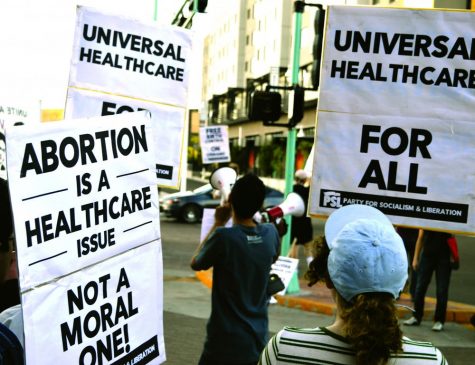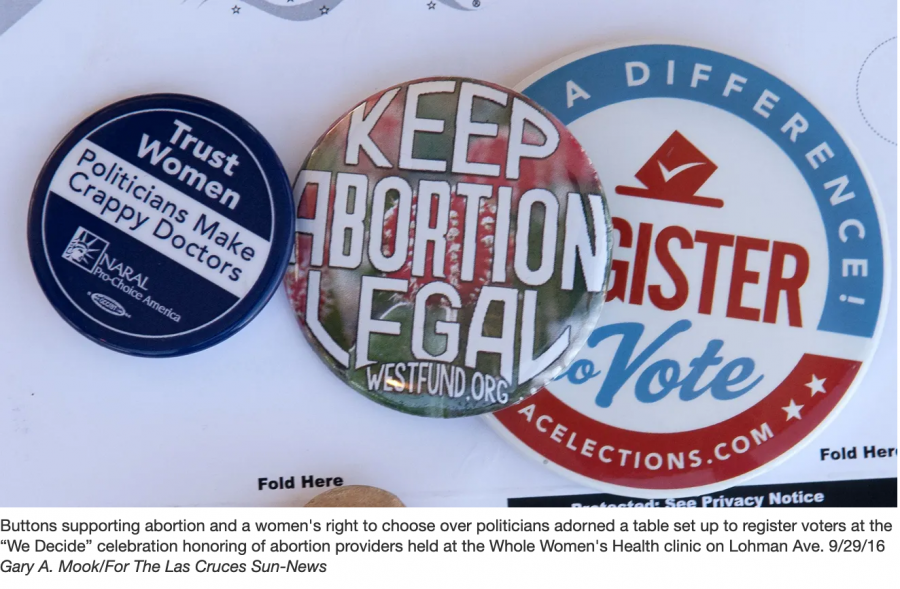Abortion in New Mexico?
What is the state of the law?

A week into the legislative session, abortion and reproductive rights are a hot topic in New Mexico’s virtual Roundhouse. Reproductive rights advocates hope that this will be the year that the state legislature will finally vote to repeal New Mexico’s abortion ban, restricting access to abortion care, which has been on the books since 1969. The law has been unenforceable since the Supreme Court ruled on Roe v. Wade in 1973, as a federal ruling takes precedence over state law. However, with an ideological conservative-leaning court and increasing stigmatization surrounding abortion care, progressives and activists fear that reproductive rights could be pushed back 50 years if the ban is not repealed.
The 1969 Abortion Ban, in conjunction with the overturning of Roe v. Wade, could change the future of abortion care and reproductive health in New Mexico. The ban states that a woman may not receive an abortion unless certified in writing by a hospital board. “It does not reflect the way in which abortion care is provided today,” says Ellie Rushforth, a Reproductive Rights Attorney at the ACLU. Furthermore, obtaining permission from a board would present challenges. In discussion, a physician said, “Which board will be established for this? Who sits on this board? Does this infringe on our rights?”
In the earliest years of American history, abortion care was legal. It only became a criminal offense in the late 1800s when the newly formed American Medical Association (AMA) saw abortion providers as unwanted competition in a growing industry, and thus decided to condemn and criminalize the practice. “The violent extremism that exists today likely began in the ’70s and ’80s,” Rushforth says, “The stigma comes from a lot of places. Some people have this misconception about who gets an abortion, and who seeks abortion care, and why.”
Even with the ban on the books, New Mexico has some of the country’s best reproductive laws. The state allows women on Medicaid to receive abortion care, and there has been a widespread push to expand contraception coverage. New Mexico is one of 16 states that allow abortion under Medicaid coverage, which was stripped in 1976 with the Hyde Amendment, barring federal funding for abortion. This ban, like many other abortion bans, disproportionately affects marginalized communities. On the Senate floor back in 1976, former Senator Hyde (R-IL) said, “I would certainly like to prevent, if I could legally, anybody having an abortion, a rich woman, a middle-class woman, or a poor woman. Unfortunately, the only vehicle available is the HEW Medicaid bill.” The states that choose to proceed with the Hyde Amendment have infringed upon marginalized populations’ reproductive freedom. As Gloria Steinem put it, “Without the power to make decisions about our own bodies, there is no democracy.” The first woman to die because of the Hyde Amendment was named Rosie Jimenez. She was a single mother from Texas on Medicaid who was denied access to abortion care. With limited options, she decided to receive an unsafe abortion, and with that decision, she became a casualty of the Hyde Amendment.
New Mexico is one of the country’s poorest states, one of two states to break the 20% poverty rate threshold. As of 2017, 91% of New Mexico counties did not have access to a clinic that provided abortions, and 48% of New Mexican women lived in these counties. “Abortion care is difficult to access,” says Rushforth. These statistics will worsen if abortion coverage is stripped.
The Mexico-City Policy, created by the Reagan Administration to prohibit the use of foreign aid from the US to fund abortion on foreign ground, was renewed by the Trump Administration in January of 2017. They renamed it “Protecting Life in Global Health Assistance,” however it seems to establish a framework for the Administration’s will to overturn Roe v Wade, furthering the inequities of abortion coverage in the states and across the world. Known as the “global gag rule” by critics, the policy requires foreign Non-Government Organizations (NGOs) to certify that they will not “perform or actively promote abortion as a method of family planning.” Since the Reagan Era, the policy approval has been separated by party lines, with every Democratic Administration rescinding it and every Republican Administration reinstating it. President Biden is set to rescind it in the coming days.
Abortion is not as foreign as people claim it to be. About a fourth of women in the U.S. will receive an abortion in their lifetime, yet there is still a presiding stigma on the concept. As a society, it is crippling to think about abortion, and people tend to make it a polarized and binary discussion when really the issue is not black and white.
This legislative session will be pivotal for the future of New Mexico’s abortion care and reproductive rights. According to the ACLU, it is a fight to “keep abortion safe and legal.” Abortion access has been at the national forefront in recent years; now, the same questions will be playing out on our homecourt.

After joining The Advocate in her sophomore year, Mireya quickly fell in love with journalism, storytelling, and the community that is created and engaged...







